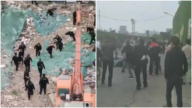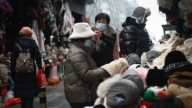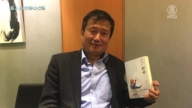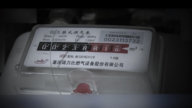【新唐人2014年06月25日訊】目前中國大陸富商扔下巨額債務逃跑的現象層出不窮,甚至曾經榮登「胡潤百富榜」的知名首富也難逃跑路厄運。專家指出,中共對民運企業政策是民營企業陷入危機的主要原因,而對殭屍般的國營企業的無限度注資,將拖垮中國經濟。
據報導,6月16號起,杭州知名企業「中都控股集團」董事長楊定國已經失去聯繫,監控視頻顯示,楊定國消失之前從辦公室搬走8個箱子,據說箱裏藏著現金、收藏品和金幣等貴重物品。
公開資料顯示,「中都控股集團」成立於2002年,擁有20多家子公司,業務涉及浙江、安徽等多省的房產、百貨、酒店、金融、園林、物業等項目。多次被銀行和授信單位評為信用AAA級。目前,「中都集團」多家百貨門店、房地產業務等其他業務都已經停業。而「中都集團」已經欠下20億人民幣巨額借債,連日來各路債主正在佔領集團總部。
17號,安徽桐城市工商聯主席、總商會會長劉克勝,也突然去向不明。身家八億多,坐擁九家公司的劉克勝失聯的原因,據說是資金交易鏈斷裂。
5月底,溫州商界具傳奇色彩的女富商徐雲旭,也消失得無影無蹤。5月27號,曾經榮登「胡潤百富榜」的柳州首富廖榮納,因為深陷巨額債務的泥潭,被立案調查。
北京師範大學MBA導師段紹譯:「第一點中國不是真正的市場經濟,政府的干預太大,受政府政策的影響太大,很多企業很難有正確的預期,第二,這些老闆整體素質偏低,以為自己有多麼厲害,融資過程中不計後果,第三中國對損人利己的行為打擊不力,很多騙子更加不計後果。」
北京清華大學經濟管理學院教授楊斌:「對民營企業扶持根本就沒有,沒有降息也沒有減息,這叫甚麼扶持,現在明顯的經濟危機,國內生產消耗不了,出口,人民幣升值了怎麼出口,投資不行了,哪個企業是興盛的?沒有。在這種情況下,國家不扶持,那就倒閉、逃跑,跳樓的都有。」
中共喉舌《人民網》盤點了最近兩年來中國「跑路的10大著名富商」,其中包括「世紀天成房地產公司」董事長黃水木、,「快播科技」公司執行長王欣、溫州創業青年楷模候選人潘曉勇等。報導說,這些富商大多都是因為債主圍堵,躲債跑路。
旅美經濟學家簡天倫指出,中國的貸款政策使民營企業陷入危機。
據中共官媒報導,中國民營企業融資難,融資貴,小額貸款平均利率超過20%,而銀行搞的互保政策,又導致個別企業出現經營困難而無法償還貸款時,導致其他企業一塊遭殃。
段紹譯:「中國的金融主要是為國企服務的,國企可以很低的成本就可以借到銀行的錢,而民間的企業很高的利息也很難借到銀行的錢,甚至基本借不到。」
北京師範大學MBA導師段紹譯指出,很多民營企業表面上虧錢,是因為它們負債太多,而國營企業,因為它的壟斷性,以及國家的政策、土地支持、貸款支持,營業成本低,即使表面上盈利,實際也是虧損。
楊斌:「民營企業是生產的主力,佔GDP的70%,就業佔7、80%,不出好政策,一點希望都沒有,這國家經濟形勢。國有企業本來殭在那兒了,很難活,你非要注資增加它的活力,我認為政府就在後退,政策不出,這經濟好不了。」
英國《路透社》報導說,中國的民營企業是在夾縫中找生活。由於缺乏公平的經營環境,加之名目繁多的稅負,不斷上升的勞動力及物料成本,以及銀根收緊等多種因素的擠壓,中國的民營企業家們正面臨著去留兩難的境地.
加上用工荒、錢荒、電荒,高成本、高稅負,低利潤的殘酷現實, 報導形容民營企業在風雨中飄搖的日子,似乎比金融危機時代更加艱難。
採訪編輯/劉惠 後製/葛雷
Who’s to Blame as Private Entrepreneurs
Run Away With Huge Debts
Rich businessman in China running away from huge debts
is becoming a frequent occurrence.
Even a renowned tycoon from the famous Hurun list of the
top 100 richest Chinese is included among them.
Experts say that Chinese Communists Party’s (CCP)
policies toward private enterprises are the main reasons
for the current crisis in the private sector.
They say the CCP’s endless injections into crumbling
state-owned enterprises will drag down China’s economy.
Contact with chairman Yang Dingguo of renowned Zhongdu
Holding Group is reported to have been lost since June 16.
Surveillance video showed Yang Dingguo taking eight boxes
from his office before he disappeared.
The boxes supposedly contained cash,
collectibles, gold coins and other valuables.
Zhongdu Holding Group was established in 2002.
According to public data, it owns more than 20 subsidiaries,
with business in real estate, department stores, hotels, finance,
gardening, and more, in Zhejiang and Anhui provinces.
It was awarded “Grade AAA” many times by
banks and credit agencies.
Currently many of its department stores
and real estate businesses have closed.
Zhongdu Holding Group has a huge debt
of 2 billion yuan ($321 billion), and creditors
have recently occupied its headquarters.
On June 17, Liu Kesheng, who was the Business Association
chairman and president of the Tongcheng City Chamber of
Commerce in Anhui Province also disappeared.
Liu Kesheng has more than eight hundred million yuan
and nine companies.
The reason for him losing contact is reportedly
breaking of the funding chain.
At the end of May, legendary Wenzhou businesswoman
Xu Yunxu also disappeared.
In Liuzhou City on May 27, Liao Rongnan,
a man famed as one of the 100 Richest Chinese,
was put under criminal investigation due to huge debts.
Duan Shaoyi, Beijing Normal University MBA instructor:
“Firstly, China is does not have a true market economy.
The government intervenes too much.
It’s difficult for many companies to get a correct forecast,
affected by government policies.
Secondly, the overall quality of these bosses is low.
They think they are so capable and do not consider
the consequences when they get some money.
Thirdly, they do not care about others,
so they are even more reckless."
Yang Bin, economics and management professor
at Qinghua University: “Private enterprises get no support,
such as lower interest rates.
There is obvious economic crisis.
Domestic production cannot be consumed and
export cannot be done due to RMB appreciation.
Which companies are thriving now?
Without help from the state, they go bankrupt.”
CCP mouthpiece People’s Daily listed the
“Top 10 Runaway Rich Business People,” including
the Century Tiancheng Real Estate chairman Huang Shuimu,
Kuaibo Technology CEO Wang Xin and Wenzhou City’s
young entrepreneur model candidate Pan Xiaoyong.
The report says these wealthy men ran off mostly due to debts.
US-based economist Jian Tianlun says that
China’s lending policies lead to crisis of private enterprises.
According to CCP official media, it is difficult and expensive
for China’s private enterprises to get investment,
with average rate over 20% for small amount of investment.
Banks’ mutual insurance policy also led to the simultaneous
collapse of many businesses whenever one business
ran into difficulties.
Duan Shaoyi: “China’s financial services are primarily for
state-owned enterprises.
State-owned enterprises can borrow money at a low cost.
It is hard for private enterprises to borrow money,
because they cannot get money from the bank."
Duan Shaoyi says that many private enterprises
seem to lose money because they have too much debt.
State-owned enterprises are profitable on the surface,
but it is due to monopoly, lending support and low costs.
Duan Shaoyi says they actually lose money.
Yang Bin: “Private enterprise is the main force of production,
accounting for 70% GDP and 70% to 80% of employment.
The country’s economy has no hope without good policy.
State-owned enterprises cannot improve.
The government’s continuous investment is backward.
Without better policies, the economy cannot improve."
Reuters reported that China’s private enterprises
are looking to survive amidst the cracks.
Lack of a fair business environment, coupled with numerous
varieties of taxes, rising labor and material costs, as well as
monetary tightening has driven China’s private entrepreneurs
into a dilemma of whether to continue or shut down.
In addition, there are issues of labor shortages,
a money shortage, an energy shortage, high costs,
high tax burdens and the harsh reality of low profits.
Reports say private enterprises are in danger, and that things
seem to be more difficult than in the period of financial crisis.
Interview & Edit/LiuHui Post-Production/GeLei



























